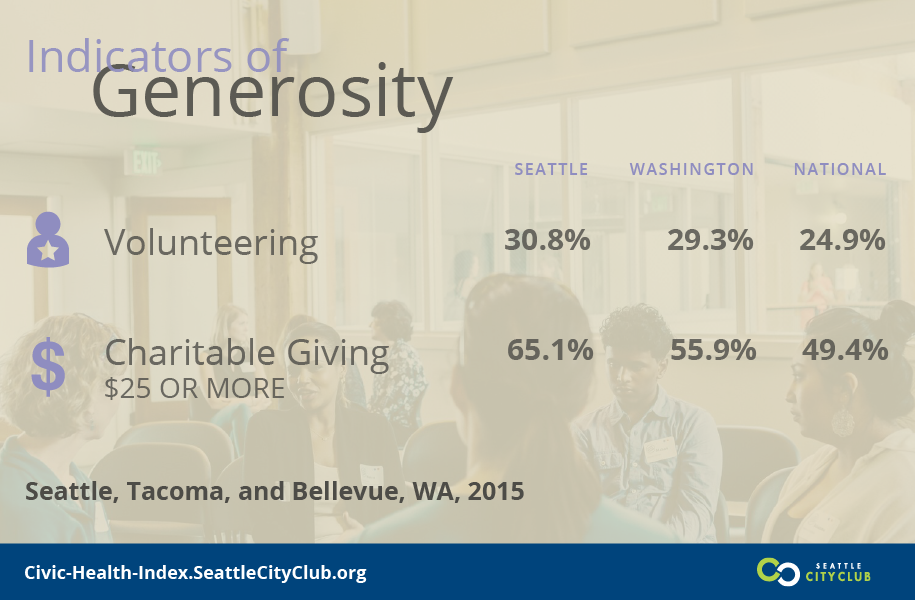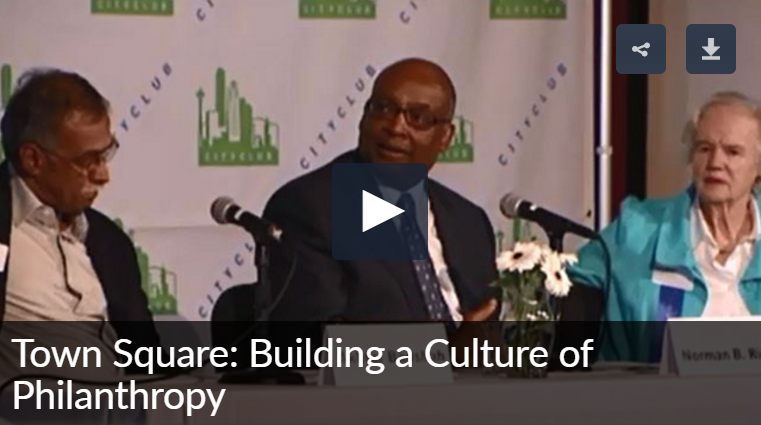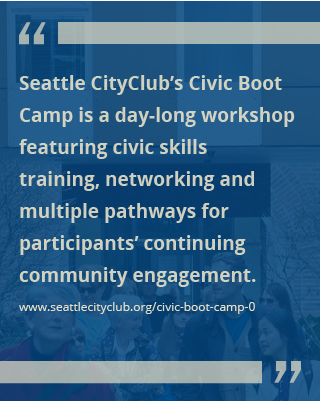Generosity
Seattle is first in the nation when it comes to the number of residents—over 65%– who donate $25+ to charity annually. We are also first in private foundation revenue per capita. Highly visible philanthropic institutions foster a positive culture and training ground for personal giving, and generous individuals inspire their professional and peer networks to give. This virtuous cycle stems from a long and continuing history of philanthropic activism and innovation in greater Seattle. It is now part of the region’s DNA.
Seattle Foundation is fueling our region’s virtuous cycle of generosity with its annual GiveBIG campaign, one of the largest in the country. The campaign uses viral promotion, financial incentives, partnerships and competition to motivate giving. Participation provides new and renewing donors a sense of pride and agency as part of a community that can make things happen.
Volunteering
While greater Seattle ranks twelfth among the nation’s 51 metro areas for volunteering, like the country at large, we’re in a declining trend. 31.1% of regional residents volunteer, half the number who make philanthropic gifts. As philanthropy in our region is a rising trend, it begs the question of whether Seattleites have more money than time to give.
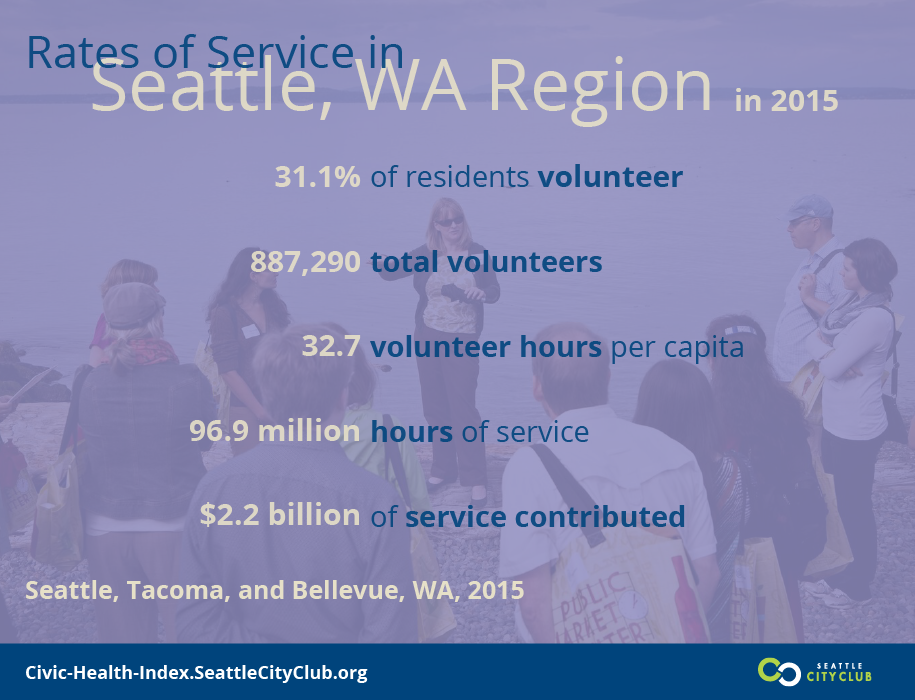
Volunteer Rate of Greater Seattle Residents by Year
Volunteering by Organization Type in Greater Seattle
Volunteer Activities in Greater Seattle
Engaged employees: a bottom line investment
Promoting employee engagement is good for business. Engaged employees are more loyal, work harder and stay at their jobs longer.
In our region, times are good and competition to recruit and retain the best and brightest workers is global and fierce. Businesses that invest in their employees’ personal and professional development, leadership training and community engagement have an important competitive edge. But even in challenging times, volunteering is linked to stronger economic resilience for communities and more rapid re-hiring for unemployed workers.
United Way of King County’s Corporate Volunteer Council is working to professionalize the field of employer-based volunteer management and create closer bonds with regional nonprofits.
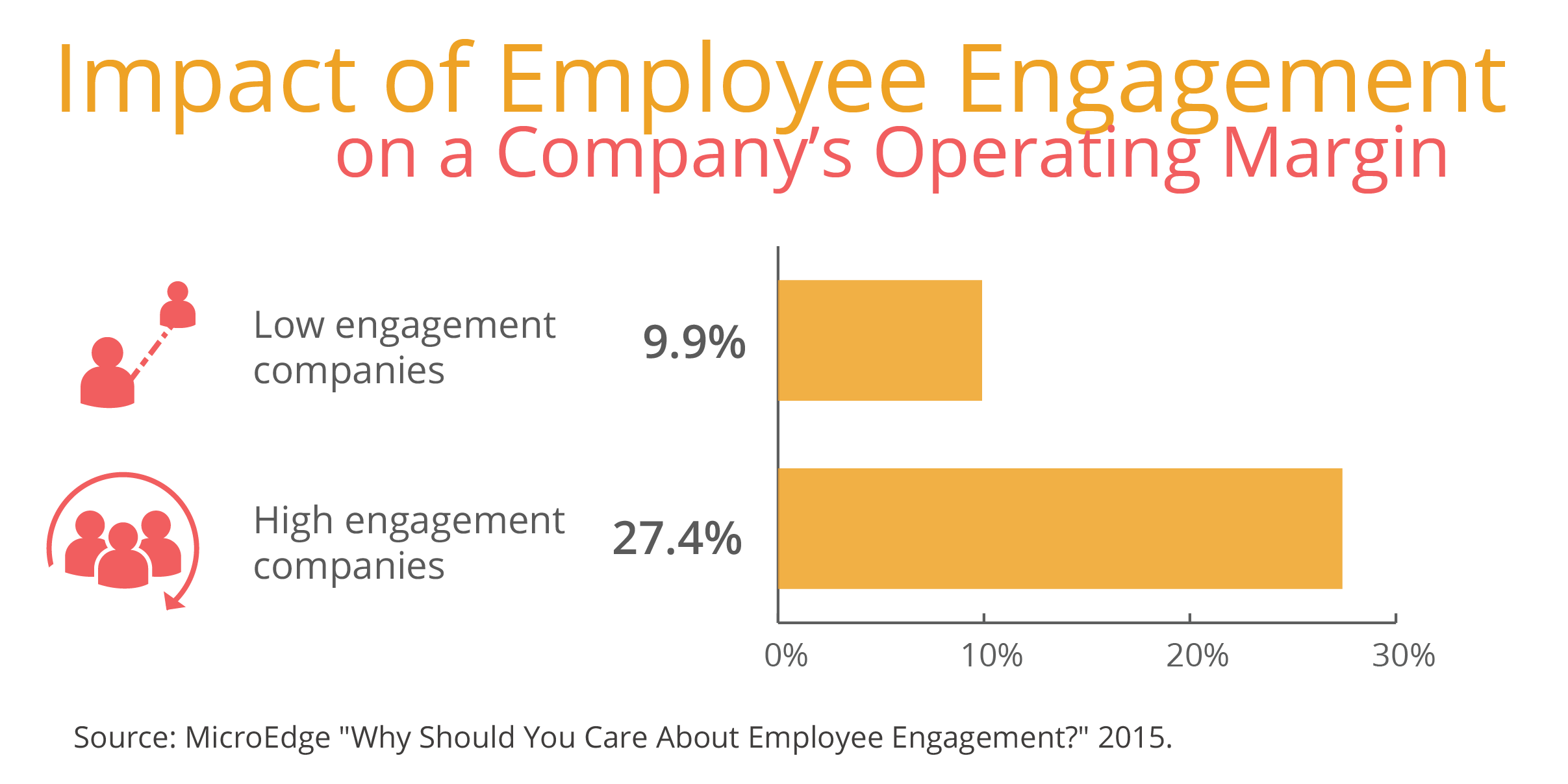
America’s Charities reports that employees most committed to their organizations put in 57% more effort on the job and are 87% less likely to resign—than employees who consider themselves disengaged.
Building civic pathways
Both volunteering and philanthropy are strongest in regional residents’ peak earning years, from age 30 to 64. Like many other civic health metrics, they increase with education and income. Women give and volunteer at higher rates than men.
Researchers report that giving and volunteering are better leveraged when they are linked. Integrated programs yield better outcomes when it comes to boosting participation and results.
While greater Seattle offers many different community engagement programs with a range of opportunities for becoming informed, leadership development, volunteering and giving, they are not connected with one another in an integrated portfolio of offerings. There is no “one stop shopping place” for community engagement, nor does one program lead organically to the next opportunity. Creating a linked and well-promoted map of civic engagement pathways would be a great asset to regional civic health.
Explore the demographic disparities in greater Seattle’s civic health
Click on the icons below and filter by indicators to change the bar chart
Source: National Conference on Citizenship analysis of the Census Current Population Survey data
Tech civic meetups
Greater Seattle is fortunate to be a power house of technology industries with so much to offer regional civic health: a highly educated workforce, tools to democratize information and foster social networks, technology expertise and resources typically out of reach for non-profits. While there are examples of promising and powerful collaborations between technology companies, workers, non-profits, government, universities and civic and social entrepreneurs, the full impact of these synergies has not yet been realized.
Washington Technology Industry Association
With support from Microsoft and Comcast, Washington Technology Industry Association is piloting Ion, a program that connects volunteers from government, tech, non-profits, and education to co-create human centered, technology-enabled ways to improve the quality of life of people in our region. Cross-sector and cross cultural relationships form through individuals solving problems together.
Learn more: These organizations are also helping develop connections and projects that address community needs through technology-enabled support and cross-sector collaboration.
Obstacles and solutions
Following are recommendations to improve work and prosperity in Greater Seattle through civic engagement.

We don’t take full advantage of our residents’ civic capital—their talent, their desire to serve, their knowledge, skills and willingness to improve civic life.

Recognize and promote employee engagement as an economic development tool to help recruit and retain a highly skilled and committed workforce.
Provide greater Seattleites with welcoming, clear, progressive steps to build their civic knowledge, networks and opportunities for engagement.
Invest in partnerships between the region’s civic and tech communities.
![]()
Civic Health
Index
Visit the homepage, this section explores greater Seattle’s civic health and offers recommendations for you—for all of us—to improve it.
![]()
Personal and Community Health
Examines neighborliness public trust, discrimination and social connections in greater Seattle and how they affect individual and communal vitality
![]()
Empowerment and Inclusion
Examines rates of voting, political expression, and organizing in greater Seattle and how they impact political and civic power

